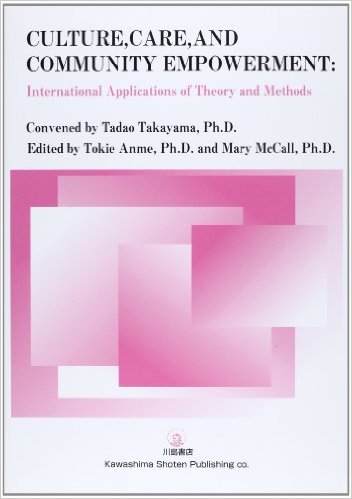Book: Culture, Care, and Community Empowerment:International Applications of Theory and Methods
Preface
As industrialism and economic development have swept across the globe, cultural values and the role of the elderly in various societies have become casualties of the drive towards materialism and economic progress. As many industrialized nations face an aging population and the economic strains of changing dependency ratios, societies will have to create social policies and programs to meet the needs of their new demographic. And, these needs will have to addressed through the cooperative efforts of many facets of any society – governments, both national and local, non-governmental organizations, non-profit and private-sector organizations, and families and individuals themselves. At the OECD forum in 2002, William Novelli, Executive Director of the AARP, noted that nations need to enact social policies related to aging issues that create economic and social sustainable development, design and nurture broad conversations and processes that include a wide range of participants’ voices, and support positive social change so that we can create healthier communities across the lifespan (Novelli, 2002). The analysis of any country’s policies and programs from even 50 years ago reveal that new theories and methods of social program development, implementation, and analysis are required to face population profiles that have never existed before on the planet. The long-discussed notion of empowerment is a useful concept or goal in this new world, but one which requires a concrete framework for implementation – a framework which can cross national and cultural boundaries to be utilized in many different situations.
This book offers such a framework of community empowerment, initially devised in Japan, but one which can be fruitfully applied in other settings, with appropriate accommodation to any local cultural values. It is only through the understanding and incorporation of cultural values that any general framework for empowerment will be effective. Equally important are the methods used to evaluate the effects of such programs to ensure the real progress is being made. And, then, there may be hope that we can create communities that can meet their own needs, in an interdependent manner that draws on many levels of contribution to make lives worth living across the lifespan, regardless of where on earth we live.
ORGANIZATION OF THE BOOK
In the first section of the book, Theoretical Foundations of Empowerment, Chapter 1 summarizes the history of the concept of empowerment, how it has been utilized across a variety of settings and issues, and how, more recently, it has come to be seen as both a goal and a process that occurs at multiple levels and requires collaboration amongst multiple groups to truly achieve. In Chapter 2, we offer the rationale for being conscious of cultural values when engaging in an empowerment process, especially given the rapid social and cultural changes that many societies are facing today. Traditional cultural values are obsolete in some cases, morphed into a hybrid of new and old values in other cases, and a crucial element in any hope of successful program development and implementation in all cases. Jackson (2002) points out the importance of examining aging and other human developmental phenomena only in the context in which it is occurring. Chapter 3 presents the CASE Model of empowerment offered here, developed initially in Japan over many years. In the second section of the book, International Practice and Applications, we offer examples from a variety of countries where the CASE empowerment model has been applied. These countries include Japan(Chapter 4), Sweden (Chapter 5), the United States (Chapter 6), Australia (Chapter 7), and Israel(Chapter 8). Chapters 4 through 6 offer applications at a more local level, analyzing empowerment processes on the specific issues of health promotion, housing, and housing for seniors with special needs within relatively local, small communities. Chapters 7 and 8 approach the empowerment process from a more national perspective, providing unique insights into the challenges faced when attempting to inculcate empowerment practices at a national level. We then present a Counterpoint perspective from Sweden (Chapter 9) which raises questions about when empowerment of one group occurs (the elderly), what implications might that have for others involved in a care provider relationship with those older persons? In the concluding chapter (10), we offer an overarching summary of what we have learned works well in a variety of culture contexts and provide concrete tools to assist in empowerment efforts. Our hope is that this work contributes to the global efforts of many who seek to create environments in which we can all thrive and be truly empowered.
Book Information
Order: Kawashima Press
e-mail kawashima-ed@kazekusa.co.jp
TEL +81-(0)3-3365-0141 FAX +81-(0)3-3365-1101
Adress: 7-15-17 Nishi-shinzhiku Shinzyuku Tokyo 160-0023 JAPAN
ISBN978-4-7610-0858-1, 2008 October, 126page,
3,150yen

Japanese Book Review
当事者主体のケア推進のキーワードとして、エンパワメントが世界中で注自されている。本書は新しいコミュニティ・エンパワメントの理論と方法論を提案し、各国の文化に適合した展開への一助とすることを自的としている。
すなわち、コミュニティ・エンパワメントの実現に向けて、当事者の力を組織的に引き出すコミュニケーション、参加型チームワーク、支援ネットワーク、双方向マネジメントなどの理論と技術を体系的に整理し、各国で適用した例をあげている。ケアに携わるすべてのプロフェッショナルにとって、スキルを磨く上での必読書。
